on The Anthropologists, a novel by Ayşegül Savaş
Asya, the narrator of Ayşegül Savaş’ third novel, The Anthropologists, is recollecting her early days with her partner, Manu. “Back then, we were only playing out our adulthoods rather than committing to them,” she says. “Now it was time to expand. To make a life, as some people called it. We wouldn’t have called it that, but we agreed that we had to make things a bit more solid.” She and Manu met as students; they didn’t speak the same language. In Asya’s tale, they have emigrated and live in “the city.” Manu works for a nonprofit organization. Asya, having received a grant to shoot a documentary, frequents a nearby park to interview people. When not working, the couple spend time with their few friends, and go looking for an apartment to accommodate a “more solid” life together.
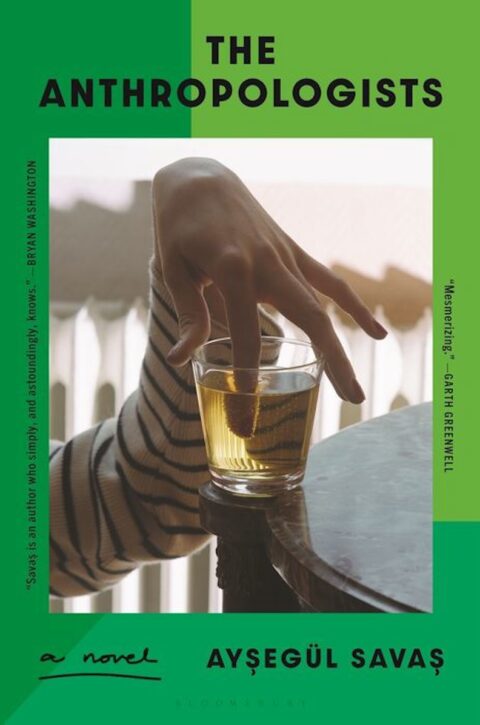 “For most of the people we were acquainted with, Manu and I were nothing much more than our countries of origin, our accents, our work,” she recalls. “And I yearned for a specific existence.” Although estrangement – from home country and family – tints Asya’s story, this isn’t a novel about the plight of immigrants. She has no such grievances and enjoys the city’s cadences. In an interview at Publisher’s Weekly, Savaş stated, “I wanted the book to not feel locked into its own age.” Such a strategy challenges the dominant algorithms of the publishing industry. Nevertheless, Asya lets us know that “panic assaulted us daily, in newspapers and documentaries, in graffiti and posters and demonstrations.” But she doesn’t elaborate, or assert her identity in opposition to the usual societal antagonists. Rather, Asya tells us what it was like to feel her way towards “a specific existence.” By positioning Asya’s narrative on the sound foundation of her life with Manu, Savaş neglects another box on the algorithm’s checklist, an ungratifying relationship.
“For most of the people we were acquainted with, Manu and I were nothing much more than our countries of origin, our accents, our work,” she recalls. “And I yearned for a specific existence.” Although estrangement – from home country and family – tints Asya’s story, this isn’t a novel about the plight of immigrants. She has no such grievances and enjoys the city’s cadences. In an interview at Publisher’s Weekly, Savaş stated, “I wanted the book to not feel locked into its own age.” Such a strategy challenges the dominant algorithms of the publishing industry. Nevertheless, Asya lets us know that “panic assaulted us daily, in newspapers and documentaries, in graffiti and posters and demonstrations.” But she doesn’t elaborate, or assert her identity in opposition to the usual societal antagonists. Rather, Asya tells us what it was like to feel her way towards “a specific existence.” By positioning Asya’s narrative on the sound foundation of her life with Manu, Savaş neglects another box on the algorithm’s checklist, an ungratifying relationship.
Savaş so exquisitely captures the daily rhythms, concerns and interactions of Asya’s life that something may escape us– namely, what we’re actually hearing is the sound of Asya’s life post-story, her presence. “During my interviews in the park,” she says, “I was mesmerized by the routines of strangers: I wanted to ask questions that burrowed deeper into the fabric of a single day. As I continued filming, I was also beginning to articulate a feeling I’d had, dormant, for a long time. Everyone, it seemed to me, had something truly weird about them, something unique and bizarre. This uniqueness was most apparent in everyday acts, in the banal rather than the extraordinary.” And this is exactly what Savaş is doing as well.
Manu and Asya meet up several times with their pal Ravi: “We recognized in him something we recognized in each other: the mix of openness and suspicion; a desire to establish rules by which to live, and only a vague idea about what those rules should be.” There is Asya’s friend Lena, “my only native friend in the city.” Then, there are the apartments they check out, always finding fault with one thing or another. Asya’s father visits briefly, so does her school friend Sara. And that’s about it for plot, if this matters to you. What matters here is the halting but essential process of discernment – both Asya’s and ours. At one apartment viewing, Asya and Manu meet the married owners, the woman pregnant, the man saying “this house is our first child.” Then Asya, reflecting on why the owners were moving to a farmhouse, says to us:
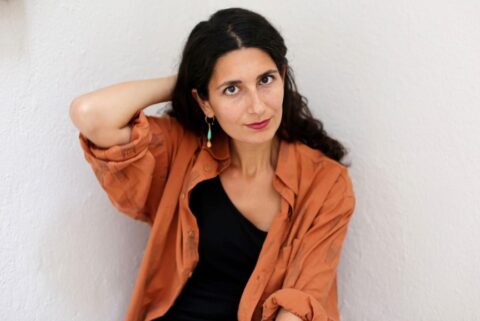 “Then there was the pace of the city, the anonymity, the stress; there weas the wish to live another type of life, with real neighbors and homegrown vegetables. I felt stifled by the clarity of my knowledge, which seemed unreal, or too real. As if everyone ended up living the same sort of life, describing it with the same words. With enough focus, I could probably predict our lives as well, the types of people we would resemble. There was something inevitable in choosing, in looking ahead: there are only so many options.”
“Then there was the pace of the city, the anonymity, the stress; there weas the wish to live another type of life, with real neighbors and homegrown vegetables. I felt stifled by the clarity of my knowledge, which seemed unreal, or too real. As if everyone ended up living the same sort of life, describing it with the same words. With enough focus, I could probably predict our lives as well, the types of people we would resemble. There was something inevitable in choosing, in looking ahead: there are only so many options.”
Savaş enrolled at Middlebury College in 2003 and studied anthropology – and if The Anthropologists is an autofiction, it has skirted that sub-genre’s tendency in its less artful forms to be so absorbed in checking in on its own condition that it can’t bond with the reader. Asya critiques her view of autonomy, her free-form city life, as “an unquestionably desirable state.” But what, then, are the aspects of a “more solid” life for her and Manu? I must leave Asya’s final realization or assessment for you to discover.
“There’s a particular kind of reader who gets pissed off by my writing,” said Savaş in the interview. Early in the novel, Asya says, “And what we wanted above all, what we wanted to find in the city, were people with whom we could abandon the rules even as we were establishing them, those people who could become our family.” Those who get pissed off are missing a familial pleasure. In abandoning some of the market’s rules of fiction – Savaş invites us to experience the renewable rules of expression — the old ways of being new — that are in play when an artist is performing at the sublime height of her art.
[Published by Bloomsbury on July 9, 2024, 192 pages, $24.99 hardcover]
* * * * *
Overstaying by Ariane Koch, translated from the German by Damion Searls
In 2010 during a visit to London, my wife and I took in an exhibit at the Barbican Centre called “The Surreal House: Architecture of Desire.” In spaces depicted by first-generation surrealists such as Marcel Duchamp, Man Ray and Rene Magritte, to contemporary figures like Joseph Cornell, Maya Deren and Edward Kienholz, we were struck by the persistence of the house-interior in their work – spaces that both contain and liberate the imagination. “Housed everywhere but nowhere shut in, this is the motto of the dreamer of dwellings … a daydream of elsewhere should be left open therefore, at all times,” wrote Gaston Bachelard in The Poetics of Space. *
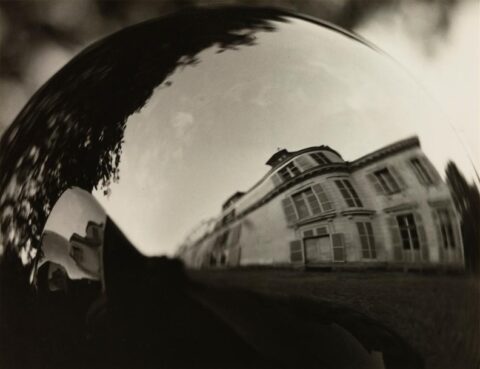 [Left — Untitled photo by Man Ray, 1920] “I have a big house even though it doesn’t look that way from the outside,” says the unnamed (presumably) female narrator at the outset of Overstaying, the playfully disquieting debut novel by the Swiss writer Ariane Koch. “It’s gigantic, though not as big as the mountain outlined so sharply against the light. I don’t own the house, I only superintend it to make sure it doesn’t fall apart. At some point my brothers and sisters will take over the house. At some point I will have to move out of the house.” Not much of a caretaker she is “Living like a tomb-keeper among things I don’t own that are increasingly falling to pieces.”
[Left — Untitled photo by Man Ray, 1920] “I have a big house even though it doesn’t look that way from the outside,” says the unnamed (presumably) female narrator at the outset of Overstaying, the playfully disquieting debut novel by the Swiss writer Ariane Koch. “It’s gigantic, though not as big as the mountain outlined so sharply against the light. I don’t own the house, I only superintend it to make sure it doesn’t fall apart. At some point my brothers and sisters will take over the house. At some point I will have to move out of the house.” Not much of a caretaker she is “Living like a tomb-keeper among things I don’t own that are increasingly falling to pieces.”
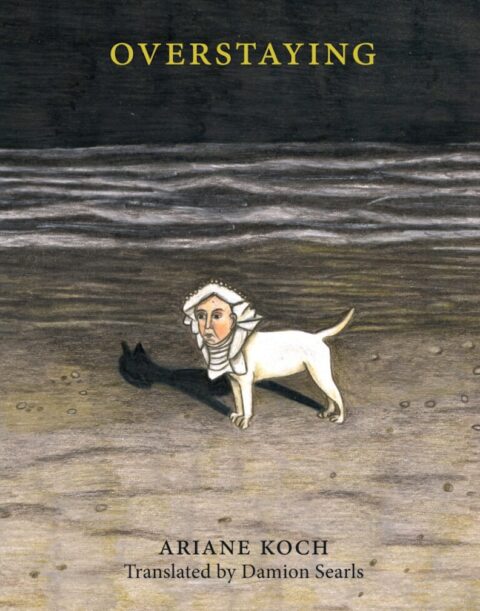 She despises her rural town and everyone in it. “I’ve been thinking about leaving and talking about leaving my whole life but I’m still here. I am the oldest fossil of all, and I hate this small town so much that I’ll have my revenge on it by never actually leaving, even if I constantly act like I’m about to.” While homeless people are camped out on the lanes, she goes to the local Roundel Bar where she encounters “the visitor” and leads him back to her house. “I led him through the streets, completely off leash, nonetheless he trotted docilely beside me.” The visitor becomes “the guest,” a shape-shifting, docile or presumptuous, servant or prisoner, thoughtful or selfish quasi-human. Sometimes he is described as having paws and fur, or “brushes” in place of fingers. Why has she taken him in? As a “scientific experiment,” however haphazard.
She despises her rural town and everyone in it. “I’ve been thinking about leaving and talking about leaving my whole life but I’m still here. I am the oldest fossil of all, and I hate this small town so much that I’ll have my revenge on it by never actually leaving, even if I constantly act like I’m about to.” While homeless people are camped out on the lanes, she goes to the local Roundel Bar where she encounters “the visitor” and leads him back to her house. “I led him through the streets, completely off leash, nonetheless he trotted docilely beside me.” The visitor becomes “the guest,” a shape-shifting, docile or presumptuous, servant or prisoner, thoughtful or selfish quasi-human. Sometimes he is described as having paws and fur, or “brushes” in place of fingers. Why has she taken him in? As a “scientific experiment,” however haphazard.
The surreal house, the site of her childhood, becomes the space of assertion and contradiction, despair and freedom, confession and subterfuge, memory and visions. Just as the surrealists discouraged their readers or viewers from finding metaphors in their work, Koch prevents us from regarding the speaker/guest relationship as a parable of modern marriage. More harshly, Koch brushes off our habit of looking for (or demanding) progressive messaging in fiction; when her “friends and acquaintances” (elsewhere she says she has none) tell her by phone that they admire her “humanistic engagement,” she accepts this praise with “pretend modesty and a fake cough.”
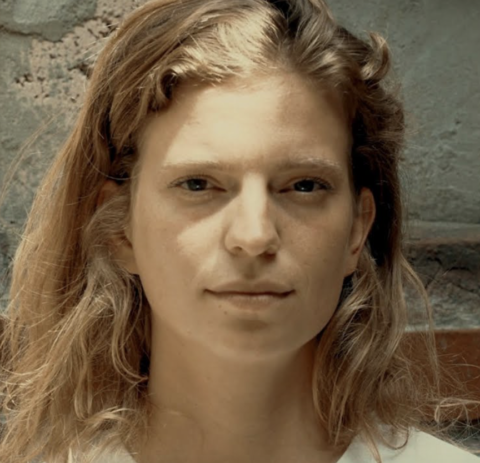 It might be asserted that Overstaying is more absurdist than surrealistic, since Koch allows much more emphasis on her speaker’s self-analysis than one finds in a classic surreal text. By this I mean that the revelation of conflicted identity quickly becomes the dominant feature of the telling. For me, such passages keep the novel aloft and help Koch skirt the potential for monotony: “All my life people have criticized me for not touching them enough. I attract people, sure, but then it’s hard to shake them off again.” But clearly, our speaker isn’t trying to shake us off. She is overstaying — but the larger question is, why are we staying with her? A denouement seems to be in store. Furthermore, her hesitations add nuance to our sense of her as a person: “The spoken word has been branded on my mind as something that can potentially, when availed of to an exaggerated extent, turn out dangerous, or inconsistent, in the sense of: withdrawing from reality and/or altering its shape.” Koch may be warning herself, if only in this one moment, in a very un-surrealistic way.
It might be asserted that Overstaying is more absurdist than surrealistic, since Koch allows much more emphasis on her speaker’s self-analysis than one finds in a classic surreal text. By this I mean that the revelation of conflicted identity quickly becomes the dominant feature of the telling. For me, such passages keep the novel aloft and help Koch skirt the potential for monotony: “All my life people have criticized me for not touching them enough. I attract people, sure, but then it’s hard to shake them off again.” But clearly, our speaker isn’t trying to shake us off. She is overstaying — but the larger question is, why are we staying with her? A denouement seems to be in store. Furthermore, her hesitations add nuance to our sense of her as a person: “The spoken word has been branded on my mind as something that can potentially, when availed of to an exaggerated extent, turn out dangerous, or inconsistent, in the sense of: withdrawing from reality and/or altering its shape.” Koch may be warning herself, if only in this one moment, in a very un-surrealistic way.
Even so, this house is inhabited by a “herd” of vacuum cleaners that swarm around, their hoses snaking along the floor. The antics of the visitor become increasingly disturbing. “He’s a collection of puzzle pieces from different puzzles,” and later, “The visitor has nested in me to such an extent that no matter how hard I try to rebel against him, I am in the end only destroying myself.”
Koch (b. 1988) was awarded the Aspekte Prize in 2021 for the best debut novel written in German. You’ll enjoy residing in this strange edifice, for though “I have basically always had great trouble telling people what they wanted to hear from me,” her isolated house-dweller offers more than enough spicy provocation, clever turns, and humorous observation to keep us engaged and wondering.
[Published by Dorothy, A Publishing Project on September 17, 2024, 176 pages, $16.95 paperback]
* In her essay “How to House the Surrealist Imagination?” (2010), Mary Ann Caws begins with the Bachelard citation and offers insights to the surrealist house. The essay is included in Symbolism. Dada, Surrealisms: Selected Writings of Mary Ann Caws, published by Reaktion Books (May, 2024).